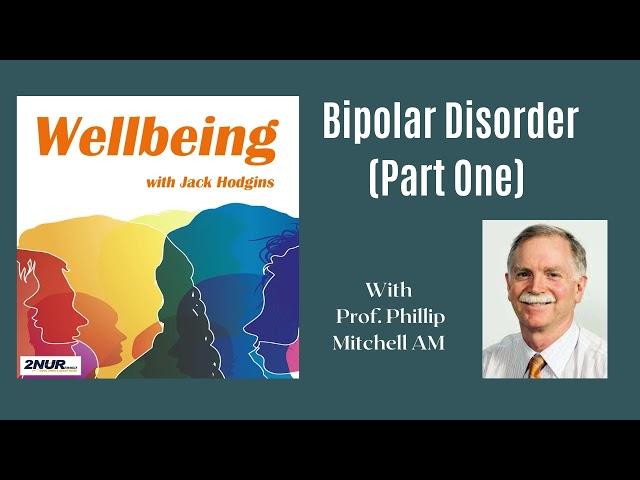
Prof. Phillip Mitchell AM - Bipolar Disorder (Part One)
This week on Wellbeing we are beginning a 12-part series on bipolar disorder. Formerly called manic depression, bipolar disorder is a mental health condition that is characterised by extreme mood swings of emotional highs, manic episodes, and emotional lows or depressive episodes. In our first instalment in this series we are talking with Scientia Professor Phillip Mitchell from UNSW. Prof. Mitchell's research and clinical interests are in bipolar disorder and he has published over 500 peer-reviewed papers, books and book chapters on the subject. He is renowned for his work in the field and in the 2010 Australia Day honours list he was awarded an Order of Australia for service to medical education in the area of treatment and prevention of mental illnesses.
In this episode Prof. Mitchell talks about what bipolar is, the types of bipolar disorder, the prevalence of bipolar disorder, the genetic underpinnings of bipolar disorder, what brain networks are being impacted by bipolar, what manic and depressive episodes are, the differences in bipolar depression to standalone normal depression, and the role of talk therapy in a person's bipolar journey.
"We know that inherited factors account for roughly about 70% of the cause of (bipolar); now some of that other 30% are stresses in people's lives, there have been studies showing that you see higher rates of childhood abuse and trauma in many people with bipolar." - Prof. Phillip Mitchell AM on this episode of Wellbeing
Tune in next week when we talk with bipolar expert Prof. Ian Hickie.
We would love to hear from you! If you would like to suggest topics, give us feedback, or just say hi, you can contact us on [email protected]
Original National Broadcast Date: 08/06/23
Host: Jack Hodgins
Wellbeing website: https://www.2nurfm.com.au/wellbeing
In this episode Prof. Mitchell talks about what bipolar is, the types of bipolar disorder, the prevalence of bipolar disorder, the genetic underpinnings of bipolar disorder, what brain networks are being impacted by bipolar, what manic and depressive episodes are, the differences in bipolar depression to standalone normal depression, and the role of talk therapy in a person's bipolar journey.
"We know that inherited factors account for roughly about 70% of the cause of (bipolar); now some of that other 30% are stresses in people's lives, there have been studies showing that you see higher rates of childhood abuse and trauma in many people with bipolar." - Prof. Phillip Mitchell AM on this episode of Wellbeing
Tune in next week when we talk with bipolar expert Prof. Ian Hickie.
We would love to hear from you! If you would like to suggest topics, give us feedback, or just say hi, you can contact us on [email protected]
Original National Broadcast Date: 08/06/23
Host: Jack Hodgins
Wellbeing website: https://www.2nurfm.com.au/wellbeing
Комментарии:
Send Free Bulk whatsapp Messages Bot Master 4.8.1.1
Digita Soft Tamil
Ayça Erturan eğilerek muhteşem göğüslerini sergiliyor Full HD
Frikik Videoları
|| Kristen Wiig vomiting ||
Madison Malfoy
Коста-Рика. В дебрях мангровых лесов. Природа нашей планеты. Документальные фильмы.
Документальные фильмы
CRAQUES que ganharam POUCOS títulos
Euro Fut
Rare TenZ moment, gets Super Mad after teammate made this super dumb play...
Nothing But Valorant
Drunk projectile vomiting
ryanodders
THE NOMAD JOURNEY | CYBERPUNK 2077 GAMEPLAY #1
Techno Gamerz


























